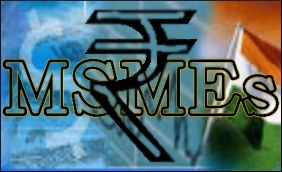|

|
'Banks need to fund MSMEs liberally at lower rates'
|
|

|
|
| Top Stories |
 |
|
|
|
SME Times News Bureau | 27 Oct, 2014
Three-fourth of the country's micro, small and medium enterprises (MSME) do not have any access to institutional finance and time has come for banks to enter long-term financing of these in a vigorous manner, says a new study.
The India Micro, Small and Medium Enterprise Report 2014, conducted by P.M. Mathew, director of the Kochi-based Institute of Small Enterprises and Development, says the inadequate flow of credit to the MSMEs is a problem and also an opportunity for banks.
According to Reserve Bank of India data, bank lending to MSMEs was only Rs.5.4 trillion as of January 2013.
"This indicates a huge opportunity in waiting," said Mathew.
"Beyond any sermonizing on 'social responsibility', a conviction on long-term benefits alone is enough for banks to enter into vigorous MSME lending.
"Such a change, however, needs some out-of-the- box thinking, and a long-term perspective. While financial inclusion is a national agenda, contextualizing it to MSMEs can create wonders," added Mathew.
The institute has advisory and consultative role with various central ministries, as also with the UN agencies.
Batting for MSME's, the report points out that the resilience of the Indian economy in the first two years after the global economic crisis, owed almost as much to the small and medium entrepreneurs in the country, as it did to the government's fiscal expansion.
The study found out that the morbidity among MSMEs is considerably less than that in the corporate sector, the recovery levels are high and speed with which they fall back on track is faster and the overall impact of failures is much lower than that in respect of large units.
"One wonders why the interest rates for MSME lending should be 13 to 15 per cent while larger industries get finance at 10 to 11.5 per cent," asked Mathew.
One way out, Mathew suggests, is through creation of a developmental orientation in both culture and practice of universal banking. Also, the concept of a chain of smaller and specialized MSME banks can be a viable alternative.
"A partnership approach involving various banks can lead to more concrete results as it can also add value to the prevailing banking culture. Indian Banks' Association could explore this opportunity," said Mathew.
|
|
|
| |
|
|
|
|
|
|
|
|
|
|
|
|
|
|
| |
| Customs Exchange Rates |
| Currency |
Import |
Export |
US Dollar
|
66.20
|
64.50 |
UK Pound
|
87.50
|
84.65 |
Euro
|
78.25
|
75.65 |
| Japanese
Yen |
58.85 |
56.85 |
| As on 13 Aug, 2022 |
|
|
| Daily Poll |
 |
 |
| PM Modi's recent US visit to redefine India-US bilateral relations |
|
|
|
|
|
| Commented Stories |
 |
|
|
|
|
|
| |
|